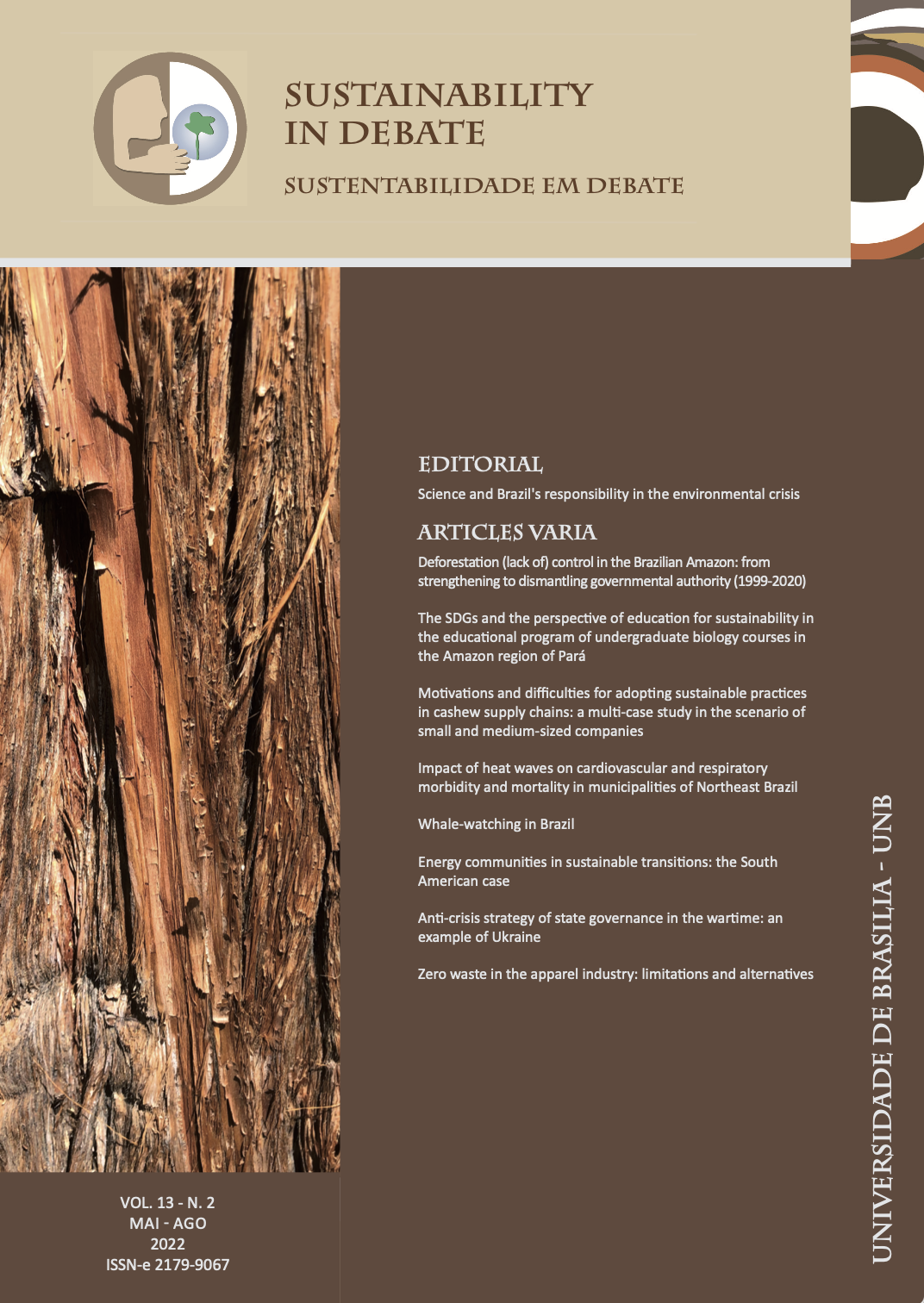Anti-crisis strategy of state governance in the wartime: an example of Ukraine
DOI :
https://doi.org/10.18472/SustDeb.v13n2.2022.44169Mots-clés :
Anti-crisis strategy, State governance, War, Socio-economic crisis, Environmental disasterRésumé
Russian military invasion of Ukraine became yet another reminder to humanity about how fragile our world is and how it requires unity and partnership to confront global humanitarian challenges and to ensure goals of sustainable development.
The article analyzes the historical context of the establishment of Ukrainian statehood, provides situational assessment of the current state of economy and environmental hazards in Ukraine and investigates successful anti-crisis «success stories» of other countries. It is namely on this basis that a strategy of changing an existing system of state governance in Ukraine has been elaborated, taking into account the consequences of the war-induced socio-economic crisis.
As conceptual framework for this strategy, provisions of the sustainable development theory were utilized, regarded by the authors as the most implementable «survival guide» for contemporary world.
Téléchargements
Références
BREWSTER, D. Murky waters, dangerous currents: India, Pakistan, China and the coming nuclearisation of the Indian Ocean, Journal of the Indian Ocean Region, v. 11, n. 2, ?. 1-4, 2015.
BURSZTYN, M. et al. The disasters of war and the (un)human condition. Sustainability in Debate, Brasília, v. 13, n. 1, p. 6-8, 2022.
CARRANZA, M. E. Deterrence or taboo? Explaining the non-use of nuclear weapons during the Indo-Pakistani post-tests nuclear crises. Contemporary Security Policy, v. 39, n. 3, ?. 441-463, 2018.
COHN-SHERBOK, D.; EL-ALAMI, D. The Palestine-Israeli Conflict: a beginner's guide (Beginner's Guides). Oneworld Publications, 2015.
CUMMINS, C.; CHERNEY, E. Ukraine War Threatens Transition to Cleaner Energy, Leaders Warn at Davos. The Wall Street Journal. May 25, 2022.
ECONOMIC TRUTH. The NBU will be the buyer of war bonds: government decision. February 26, 2022. Available in: https://www.epravda.com.ua/rus/news/2022/02/26/682802/. Acessed on: 30/06/2022
FRASER, T. G. The Arab-Israeli conflict. Red Globe Press, 4th ed. ?. 264. 2015.
INDAHSARI, C.; RAHARJA, S. New Public Management (NPM) as an Effort in Governance. Jurnal Manajemen Pelayanan Publik, v. 3, n. 73, 2020.
KAMMER, A. et al. How War in Ukraine Is Reverberating Across World’s Regions. IMFBlog, March 15, 2022. Available in: https://blogs.imf.org/2022/03/15/how-war-in-ukraine-is-reverberating-across-worlds-regions/. Acessed on: 04/07/2022
KHADZYRADIEVA, S.; SITSINSKA, M.; SLUKHAI, S. Ukrainian Public Administration at a Cross-Road. In: NEMEC, J.; REDDY, P. S. (Ed.) Public Administration in Conflict Affected Countries. Governance and Public Management. Palgrave Macmillan, Cham. 2021. p. 311–345.
MARUYAMA, M. The Second Cybernetics: deviation-amplifying mutual causal processes. American Scientist, v. 5, n. 2, 1963, p. 164-179.
M?LUHAN, M. The Gutenberg Galaxy: the making of typographic man. Routledge et Kegan Paul, 1967, 293 p.
MEADOWS, D. H.; MEADOWS, D. L.; RANDERS, J. The Limits to Growth. A Report for The Club of Rome's Project on the Predicament of Mankind. NY, 1972, 211 ?.
MINISTRY OF ENERGY AND ENVIRONMENT PROTECTION OF UKRAINE, 2022. Available in: https://mepr.gov.ua/news/39028.html. Acessed on: 30/06/2022
MYRDAL, G. Relief Instead of Development Aid. Intereconomics, v. 16, n. 2, March/April, 1981, ?. 86-89.
NABATCHI, T.; GOERDEL, H. Public Administration in Dark Times: some questions for the future of the field. Journal of Public Administration Research and Theory: J-PART. 21, 2011, ?. 29-43.
REZNIKOVA, N.; PANCHENKO, V. How to avoid the euthanasia of the Ukrainian economy. The Ukrainian Week, March 30, 2022. Available in: https://tyzhden.ua/Economics/254638. Acessed on: 05/07/2022
SASIKUMAR, ?. India’s Surgical Strikes: response to strategic imperatives. The Round Table, v. 108, n. 2, ?. 159-174, 2019.
STASHKEVYCH, O. Features of management during the war. InterConf. 2022. ?. 91-95.
UKRAINIAN NATIONAL NEWS (UNN). There are already about 300 cases of violations in the field of nature protection caused by the war. June 6, 2022. Available in: https://www.unn.com.ua/uk/exclusive/1980143-uzhe-ye-blizko-300-vipadkiv-porushen-u-sferi-okhoroni-prirodi-sprichinenikh-viynoyu. Acessed on: 01/07/2022
WORLD GOVERNANCE INDICATORS (WGI). World Bank Group, 2021. Available in: http://info.worldbank.org/governance/wgi/Home/Reports. Acessed on: 01/07/2022
YUSUF, M.; KIRK, J. A. Keeping an eye on South Asian skies: America's pivotal deterrence in nuclearised India – Pakistan crises. Contemporary Security Policy, v. 37, n. 2, 2016, ?. 246-272.
Téléchargements
Publié-e
Comment citer
Numéro
Rubrique
Licence
© Sustainability in Debate 2022

Cette œuvre est sous licence Creative Commons Attribution - Pas d'Utilisation Commerciale - Pas de Modification 4.0 International.
SUSTAINABILITY IN DEBATE – Copyright Statement
The submission of original scientific work(s) by the authors, as the copyright holders of the text(s) sent to the journal, under the terms of Law 9.610/98, implies in the concession of copyrights of printed and/or digital publication to the Sustainability in Debate Journal of the article(s) approved for publication purposes, in a single issue of the journal. Furthermore, approved scientific work(s) will be released without any charge, or any kind of copyright reimbursement, through the journal’s website, for reading, printing and/or downloading of the text file, from the date of acceptance for publication purposes. Therefore, the authors, when submitting the article (s) to the journal, and gratuitous assignment of copyrights related to the submitted scientific work, are fully aware that they will not be remunerated for the publication of the article(s) in the journal.
The Sustainability in Debate Journal is licensed under Creative Commons License – Non-Commercial-No-Derivation Attribution (Derivative Work Ban) 3.0 Brazil, aiming at dissemination of scientific knowledge, as indicated on the journal's website, which allows the text to be shared, and be recognized in regards to its authorship and original publication in this journal.
Authors are allowed to sign additional contracts separately, for non-exclusive distribution of the works published in the Sustainability in Debate Journal (for example, in a book chapter), provided that it is expressed the texts were originally published in this journal. Authors are allowed and encouraged to publish and distribute their text online, following publication in Sustainability in Debate (e.g. in institutional repositories or their personal pages). The authors expressly agree to the terms of this Copyright Statement, which will be applied following the submission and publishing by this journal.









